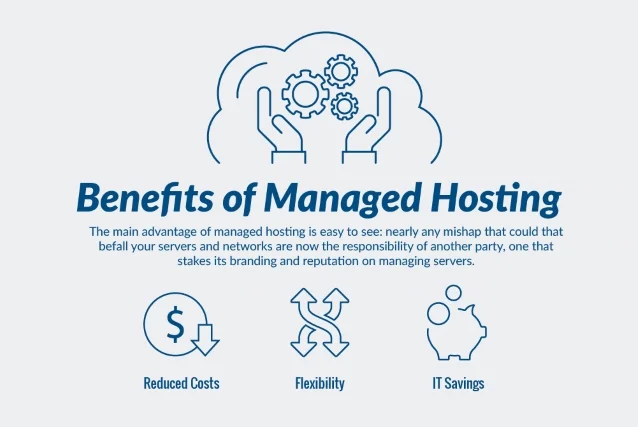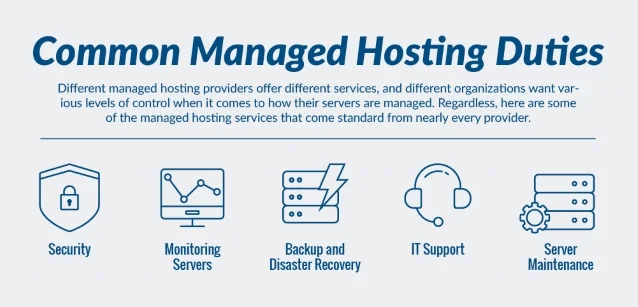What is Managed Hosting?
Managed hosting is a service wherein a third-party provider is responsible for the administration, problem-solving, and maintenance and organization’s hardware or cloud computing resources. Usually, the company that provides the managed hosting also provides the dedicated servers or the cloud-hosting environment.
How does Managed Hosting Work?
In order to establish a managed hosting arrangement, the customer can either have a cloud VPS or a dedicated server. The managed hosting adds an optional layer of management services to the server to enable the customers bring focus to their core business and enjoy substantial cost savings. This helps them streamline their cost structure and rely on the hosting provider to help save time and resources. The cost savings from not having additional in-house resources to conduct basic tasks like server backup, and security services can go a long way in savings that can be easily substantiated. By communicating with the hosting provider's team, the customer can quickly upgrade or downgrade features to fit the business needs.
What are the Benefits of Managed Hosting?
The main advantage of managed hosting is easy to see: nearly any mishap that could that befall your servers and networks are now the responsibility of another party, one that stakes its branding and reputation on managing servers.
Other benefits are more subtle but can pay off in terms of lower costs and improved efficiency in the short and long-term for your organization.
Reduced Costs: Hardware and its maintenance and upgrades are expensive, even if they are tax deductible. The worst part is that when something breaks, you have to replace it, and replace it fast, which means you can’t wait around for the best bargain. When someone else is leasing you the equipment and maintaining it, all those costs are rolled into your monthly fee, and any breakdowns are repaired seamlessly by the managed hosting company.
Flexibility: No two businesses look alike and have the same needs, but when you buy your own hardware, you’re might purchase something you won’t use to its full capabilities. Managed hosting is a solution that embodies flexibility. Your organization’s individual needs and budget will be factored in to creating a managed hosting solution that works for you, minimizing waste.
IT Savings: Employing IT professionals can be expensive. Hiring a full-time IT worker can feel unnecessary when they don’t really have 40 hours of work to do each week, but when something fails, you’re desperate for their services. Having the built-in IT services of a managed hosting company gives you the freedom to either give your in-house IT team different responsibilities, or if there is no other role for IT in the organization, reduce the position to a part-time or on-call role.

What is included in Managed Hosting?
Different managed hosting providers offer different services, and different organizations want various levels of control when it comes to how their servers are managed. Regardless, here are some of the managed hosting services that come standard from nearly every provider.
Security: One of the top needs of every organization is keeping its systems, processes, and proprietary information safe. Common functions performed include:
- Firewall configuration
- Spam filtering
- Virus scans
- Operating system upgrades
Monitoring Servers:Scanning servers to look for errors or potential threats is an important piece of maintaining a server’s performance and security. The managed host provider does this routinely to catch little glitches before they become major disruptions. Additionally, intrusion
detection systems or intrusion prevention systems help mitigate server data breaches or unauthorized access.
Monitoring Servers: Scanning servers to look for errors or potential threats is an important piece of maintaining a server’s performance and security. The managed host provider does this routinely to catch little glitches before they become major disruptions. Additionally, intrusion detection systems or intrusion prevention systems help mitigate server data breaches or unauthorized access.
Backup and Disaster Recovery: Some companies fail to anticipate the threat of a business-crippling disaster. According to InvenioIT, 30% of businesses have no disaster recovery strategy in place. If that statistic doesn’t scare you, a study by Touche Ross says that 90% of businesses that don’t have a strategy in place will fail. Hurricanes, earthquakes, and fires all happen every year. A managed host provider can back up critical information and processes so that your company continues to run smoothly no matter what happens.
IT Support: This might be the most comforting feature offered by a managed hosting provider. The more reputable providers have support in the form of telephone operators, email responders, or live chat agents available 24/7/365.
Server Maintenance: As any IT person can tell you, this is a full-time, painstaking job. Having a managed hosting provider in charge of your server’s lifecycle frees up your own IT staff for more on-site functionality.

Managed Hosting from Atlantic.Net
Our Managed Server Hosting adds a layer of business-essential Managed Services to our award-winning hosting services. Our hosting services include Cloud Hosting, Dedicated Hosting, Private Virtualization or Colocation Hosting services.
Why Choose Managed Hosting?
Atlantic.Net’s award-winning Managed Server Hosting eliminates the complexity of managing your server environment and returns focus to your business. Our certified engineers monitor your hosting environment around the clock to ensure your business is up and running 100% of the time. We handle everything from basic maintenance and server administration tasks to troubleshooting and technical support.
Our Managed Services are versatile and extensive, including diverse services in the areas of Managed Security, Managed Storage Services, OS Management Services, and Managed Network Services. These services can be tailored for your particular requirements. If you include any of these high-touch, “white glove” services with your Atlantic.Net Hosting solution, whether that's Dedicated Hosting, VPS Hosting, or HIPAA Hosting, you will have a team of certified and expert engineers at your service, performing double-duty in real-time monitoring and consultative capacities.
Guaranteed Infrastructure
Whether you choose Public, Private, Dedicated Servers or Virtualization Hosting, we back all our services with world class infrastructure and 100% up-time guarantee.
- Guaranteed Resources
- SOC 3 Certified Data Centers
- RAID 10 - 100% Solid-State Drives (SSD)
- Fully Redundant Power and Networking
- Global Regions for Redundancy and Low Latency
- Tier 1 Multi-homed (Redundant) Bandwidth Providers
- RESTful API (Application Programming Interface)
Made and managed in USA. No outsourcing, no finger pointing.
No up-front capital expense. One low monthly price.
Managed Server Hosting Features
Our Managed Hosting features help you secure your infrastructure and provide tools that make your business more efficient.
- Fully Managed Firewall Appliance
- Security Analysis and Reporting
- On-Demand Updates and Patches
- 100% SLA (Service Level Agreement)
- VPN (Virtual Private Network) Access
- Optional Load Balancing of TCP/HTTP Traffic
- Intrusion Prevention System (IPS)
- Fully Managed Daily Backups
24/7/365 Engineer Support
We are always here. You can reach our support department 24/7/365 through phone, email and chat.
Dedicated Account Manager
Hosting Environment Architects available to custom fit to your workloads to cope with any challenge
Trend Micro Deep Security
Our security suite includes anti-malware, network security, log inspection, and integrity monitoring
